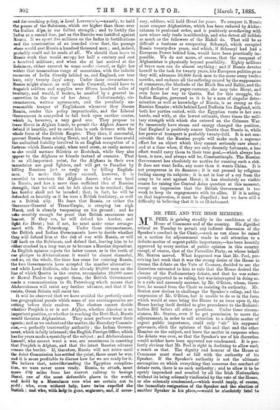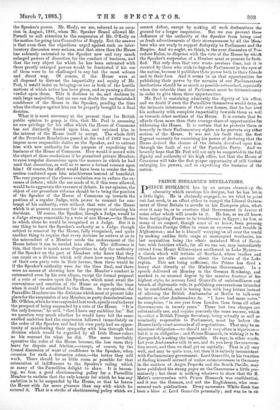MR. PEEL AND THE IRISH MEMBERS.
MR. PEEL is gaining steadily in the confidence of the House of Commons and of the country. His dignified refusal on Tuesday to permit any indirect discussion of the Speaker's conduct in the Chair,—such as can alone be raised on a motion for adjournment made to call attention to a definite matter of urgent public importance,—has been heartily approved by every section of public opinion in this country except, of course, that of the Parnellite Party, on whose behalf Mr. Sexton moved. What happened was that Mr. Peel, perceiving last week that it was the strong desire of the House to resume the debate on the Vote of Censure, decided to use the discretion entrusted to him to rule that the House desired the closure of the Parliamentary debate, and that he was subsequently supported in so ruling, but was interrupted in doing so, in a rude and unseemly manner, by Mr. O'Brien, whom, therefore, he named from the Chair as resisting its authority. Mr. Sexton now desires to challenge the Speaker's ruling, and the suspension of Mr. O'Brien, but is unable to do so in the form which would at once bring the House to an issue upon it, the House having itself decided to give precedence to the Redistribution Bill before all other questions. Under these circumstances, Mr. Sexton, even if he got permission to move the adjournment, in order to call attention to a definite matter of urgent public importance, could only " air" his supposed grievance, elicit the opinions of this and that and the other Member on the subject, and leave the matter in suspense when the debate was over, so that the Speaker's use of his discretion would neither have been approved nor condemned. It is perfectly obvious that Mr. Peel is right in declining to allow such a result as that. The dignity and honour of the House of Commons must stand or fall with the authority of its Speaker. If the Speaker's authority is not the ultimate assumption on which everything that concerns due conduct of• debate rests, there is no such authority ; and to allow it to be openly impeached and assailed by all the Irish Nationalists without its being solemnly vindicated by the vote of the House, or else solemnly condemned,—which would imply, of course, the immediate resignation of the Speaker and the election of another Speaker in his place,—would be absolutely fatal to the Speaker's power. Mr. Healy, we see, referred to an occasion in August, 1881, when Mr. Speaker Brand allowed Mr. Parnell to call attention to the suspension of Mr. O'Kelly on the motion for going into Committee of Supply. But the answer is that even then the objections urged against such an interlocutory discussion were serious, and that since then the House has solemnly entrusted to the Speaker new and very much enlarged powers of discretion for the conduct of business, and that the very object for which he has been entrusted with these greatly enlarged powers would be frustrated if his use of them were to be challenged in any but the most solemn and direct way. Of course, if the House were at all disposed to distrust the impartiality and equity of Mr. Peel, it would insist on bringing-on one or both of the hostile motions of which notice has been given, and on passing a direct verdict upon them. This it declines to do, and declines by such large majorities, that no one can doubt the undiminished confidence of the House in the Speaker, pending the time when the charges against him can be properly brought to a final decision.
What it is most necessary at the present time for British public opinion to grasp is this, that Mr. Peel is assuming no new privilege for his office which the House of Commons has not distinctly forced upon him, and enjoined him in the interest of the House itself to accept. The whole drift of the Procedure Resolutions passed at the end of 1882 was to impose more responsible duties on the Speaker, and to entrust him with new authority for the purpose of expediting the business of the House of Commons. How would it accord with the object of these resolutions if he permitted private Members to raise irregular discussions upon the manner in which he had used that discretion, as well as to move a formal censure upon him B Of course, the effect would have been to render the discretion conferred upon him mischievous instead of beneficial. The very purpose of the closure resolution was to reduce the excesses of debate ; while the use made of it, if this were allowed, would be to aggravate the excesses of debate. In our opinion, the object of our procedure reforms should be to bring the position of the Speaker of the House of Commons up towards the position of a regular Judge, with power to commit for contempt of his authority, even without that vote of the House which is at present necessary for the purpose of enforcing his decisions. Of course, the Speaker, though a Judge, would be a Judge always removable by a vote of one House,—the House in which alone he would be recognised as a Judge. But it is one thing to have the Speaker's authority as a Judge, though subject to removal by the House, fully recognised, and quite another thing to require that every decision he arrives at as to the misconduct of a Member needs the endorsement of the House before it can be carried into effect. The difference is this, that there is much more disposition to defy the authority of the Speaker on the part of Members who know that they can count on a division which will show how many Members of their own party vote in their favour, than there would be if the Speaker's authority were for the time final, and there were no means of showing how far the Member's conduct is extenuated even by his own clique, except the formal proposal of a vote of censure upon the Speaker, which must await the convenience and sanction of the House as regards the time when it could be submitted to the House. In our opinion, the Parnellite Members use the divisions which must at present take place for the suspension of any Member, as party demohstrations. Mr. O'Brien, when he was suspended last week, openly exulted over the prospect of being suspended by a vote of the House. " It is the only honour," he said, " that I have any ambition for." But we question very much whether he would have felt the same exalted ambition had the suspension followed immediately on the order of the Speaker, and had his own party had no opportunity of manifesting their sympathy with him through that division which would be regarded by all Irish Home-rulers as his warrant for what he did. The more inevitably operative the rules of the House become, the less room they leave for dispute and friction,—except, of course, by the formal discussion of want of confidence in the Speaker, when occasion for such a discussion arises,—the better they will work. There should be as little room as possible for that ostentation of indifference to the Speaker's ruling which so many of the Parnellites delight to show. It is becoming, we fear, a good electioneering policy for a Parnellite Member to exclaim that the only honour for which he has any ambition is to be suspended by the House, or that he leaves the House with far more pleasure than any with which he entered it. That is a stroke of electioneering policy which we cannot defeat, except by making all such declarations the ground for a longer suspension. But we can prevent these defiances of the authority of the Speaker from being used as fresh advertisements of their strenuousness by all the Members who are ready to support disloyalty to Parliament and the Empire. And we ought, we think, in the next discussion of Procedure Rules, to dispense with the vote of the House by which the Speaker's suspension of a Member must at present be fortified. Not only does that vote waste precious time, but it is coveted by those who wish to degrade Parliament in the eyes of the nation, because it publishes their power both to their friends and to their foes. And it seems to us that opportunities for publishing their power by the enemies of our Pailiamentary institutions should be as much as possible retrenched, especially when the valuable time of Parliament must be frittered-away in order to give them these opportunities.
Mr. Peel is sustaining admirably the dignity of his office, and we doubt if even the Parnellites themselves would deny, in the intimate intercourse of their own homes, that he has used his authority with complete impartiality towards them as well as towards other sections of the House. It is certain that he affords them more than their average share of opportunities for addressing the House. It is certain that he protects them as honestly in their Parliamentary rights as he protects any other section of the House. It was not his fault that the first flagrant necessity for exercising his power of declaring that the House desired the closure of the debate, devolved upon him through the fault of one of the Parnellite Party. And we heartily hope that Mr. Peel will not only be supported in the frill dignity and authority of his high office, but that the House of Commons will take the first proper opportunity of still further enlarging his powers, and so expediting the business of the nation.















































 Previous page
Previous page